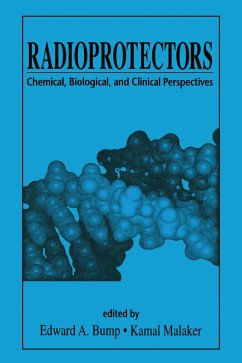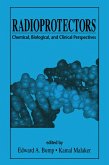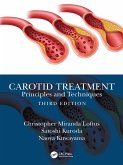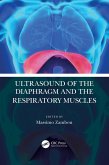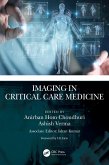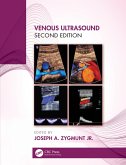Edward A. Bump, Kamal Malaker
Radioprotectors (eBook, ePUB)
Chemical, Biological, and Clinical Perspectives
45,95 €
45,95 €
inkl. MwSt.
Sofort per Download lieferbar

23 °P sammeln
45,95 €
Als Download kaufen

45,95 €
inkl. MwSt.
Sofort per Download lieferbar

23 °P sammeln
Jetzt verschenken
Alle Infos zum eBook verschenken
45,95 €
inkl. MwSt.
Sofort per Download lieferbar
Alle Infos zum eBook verschenken

23 °P sammeln
Edward A. Bump, Kamal Malaker
Radioprotectors (eBook, ePUB)
Chemical, Biological, and Clinical Perspectives
- Format: ePub
- Merkliste
- Auf die Merkliste
- Bewerten Bewerten
- Teilen
- Produkt teilen
- Produkterinnerung
- Produkterinnerung

Bitte loggen Sie sich zunächst in Ihr Kundenkonto ein oder registrieren Sie sich bei
bücher.de, um das eBook-Abo tolino select nutzen zu können.
Hier können Sie sich einloggen
Hier können Sie sich einloggen
Sie sind bereits eingeloggt. Klicken Sie auf 2. tolino select Abo, um fortzufahren.

Bitte loggen Sie sich zunächst in Ihr Kundenkonto ein oder registrieren Sie sich bei bücher.de, um das eBook-Abo tolino select nutzen zu können.
It is essential to minimize damage to normal tissues during radiation therapy and many strategies have been employed in finding the best methods for radioprotection. This book integrates chemical, biological, and clinical perspectives on these strategies and developments, providing a comprehensive treatise.
- Geräte: eReader
- ohne Kopierschutz
- eBook Hilfe
- Größe: 9.46MB
Andere Kunden interessierten sich auch für
![Radioprotectors (eBook, PDF) Radioprotectors (eBook, PDF)]() Edward A. BumpRadioprotectors (eBook, PDF)45,95 €
Edward A. BumpRadioprotectors (eBook, PDF)45,95 €![Managing Children in Disasters (eBook, ePUB) Managing Children in Disasters (eBook, ePUB)]() Jane A. BullockManaging Children in Disasters (eBook, ePUB)140,95 €
Jane A. BullockManaging Children in Disasters (eBook, ePUB)140,95 €![Carotid Treatment: Principles and Techniques (eBook, ePUB) Carotid Treatment: Principles and Techniques (eBook, ePUB)]() Christopher Miranda LoftusCarotid Treatment: Principles and Techniques (eBook, ePUB)135,95 €
Christopher Miranda LoftusCarotid Treatment: Principles and Techniques (eBook, ePUB)135,95 €![Ultrasound of the Diaphragm and the Respiratory Muscles (eBook, ePUB) Ultrasound of the Diaphragm and the Respiratory Muscles (eBook, ePUB)]() Ultrasound of the Diaphragm and the Respiratory Muscles (eBook, ePUB)72,95 €
Ultrasound of the Diaphragm and the Respiratory Muscles (eBook, ePUB)72,95 €![Imaging in Critical Care Medicine (eBook, ePUB) Imaging in Critical Care Medicine (eBook, ePUB)]() Imaging in Critical Care Medicine (eBook, ePUB)67,95 €
Imaging in Critical Care Medicine (eBook, ePUB)67,95 €![Basic Clinical Radiobiology (eBook, ePUB) Basic Clinical Radiobiology (eBook, ePUB)]() Basic Clinical Radiobiology (eBook, ePUB)99,95 €
Basic Clinical Radiobiology (eBook, ePUB)99,95 €![Venous Ultrasound (eBook, ePUB) Venous Ultrasound (eBook, ePUB)]() Venous Ultrasound (eBook, ePUB)177,95 €
Venous Ultrasound (eBook, ePUB)177,95 €-
-
-
It is essential to minimize damage to normal tissues during radiation therapy and many strategies have been employed in finding the best methods for radioprotection. This book integrates chemical, biological, and clinical perspectives on these strategies and developments, providing a comprehensive treatise.
Dieser Download kann aus rechtlichen Gründen nur mit Rechnungsadresse in A, B, BG, CY, CZ, D, DK, EW, E, FIN, F, GR, HR, H, IRL, I, LT, L, LR, M, NL, PL, P, R, S, SLO, SK ausgeliefert werden.
Produktdetails
- Produktdetails
- Verlag: Taylor & Francis eBooks
- Seitenzahl: 448
- Erscheinungstermin: 24. Dezember 2021
- Englisch
- ISBN-13: 9781000141542
- Artikelnr.: 63149519
- Verlag: Taylor & Francis eBooks
- Seitenzahl: 448
- Erscheinungstermin: 24. Dezember 2021
- Englisch
- ISBN-13: 9781000141542
- Artikelnr.: 63149519
- Herstellerkennzeichnung Die Herstellerinformationen sind derzeit nicht verfügbar.
Edward A. Bump, Ph.D., is associate professor of radiation therapy at the Joint Center for Radiation Therapy, Harvard Medical School and at the Dana-Farber Cancer Institute, Boston, MA. Dr. Bump received his B.S. in biochemistry from Cornell University in 1970. He obtained his Ph.D. in biochemistry from Oregon State University in 1975, under the direction of Dr. Donald Reed, and completed postdoctoral fellowships under the direction of Dr. Daniel Atkinson (UCLA) and Drs. Robert Fahey and Jerry Schneider (UCSD) prior to joining the laboratory of Dr. J. Martin Brown in the Department of Radiology at Stanford University, as a research associate. He was appointed assistant professor at the Joint Center for Radiation Therapy, Harvard Medical School, in 1985, and was appointed associate professor in 1995. Dr. Bump's graduate and postdoctoral research dealt with the role of thiols in regulation of cellular metabolism, and in the response of tumor cells to the anticancer agent, procarbazine. At Stanford University, he studied the role of thiols, and particularly glutathione, in the radiation response of mammalian cells. Most recently his research has been aimed at developing new strategies for chemical or biochemical modification of the biological effects of ionizing radiation. He has published approximately 50 papers, including several comprehensive reviews on modification of the radiation response. Dr. Bump is a member of the Radiation Research Society, the Oxygen Society, Free Radical Research International, the American Association of Cancer Research, The American Society of Therapeutic Radiation Oncologists, The American Association for the Advancement of Science, and the American Society of Biochemistry and Molecular Biology. Kamal Malaker, M.D., Ph.D., graduated in medicine from the University of Calcutta, India. He began his specialty training in radiotherapy and clinical oncology under Drs. Frank Ellis and Chris Paine in Oxford, England. He completed his training at The Hammersmith Hospital and The Royal Postgraduate Medical School of London University, U.K., where he worked as Senior Registrar and Tutor in radiotherapy and clinical oncology for several years. Having moved to Canada in 1977, he joined the Manitoba Cancer Treatment and Research Foundation as a staff radiation oncologist, eventually becoming the Director of radiation oncology at the the Foundation. He was also head of radiation oncology at the University of Manitoba, Canada. Dr. Malaker has maintained a lifelong interest in research on radiosensitizers and radioprotectors, on which he has authored several papers. This research continues at the Joint Center at Harvard. During his career, Dr. Malaker has maintained a strong interest in education, training, and development of radiotherapy services in developing countries and is actively involved in various programs initiated by international organizations such as WHO and UICC.
SECTION I
CHEMICAL ASPECTS OF RADIOPROTECTION
Introduction /Edward A. Bump
Chapter 1
History of Radioprotector Development /William O. Foye
Chapter 2
The Mechanisms of Radiation Protection by Non
Protein Sulfhydryls: Glutathione, Cysteine, and Cysteamine /Cameron J. Koch
Chapter 3
Aminothiols /David Murray
Chapter 4
Stable Free Radicals as Radiation Protectors /Stephen M. Hahn, C. Murali Krishna, and James B. Mitchell
Chapter 5
Radioprotection by Superoxide Dismutase /Radha M. Das
Chapter 6
DNA
Binding Bibenzimidazoles as Radioprotectors /Roger F. Martin
Chapter 7
Protection against Radiation Damage to DNA Bases /Ali Laayoun, Jean Lhomme, Maurice Berger, and Jean Cadet
SECTION II
BIOLOGICAL PERSPECTIVES OF RADIOPROTECTION
Introduction /William F. Blakely, Joseph F. Weiss, and Edward A. Bump
Chapter 8
Eicosanoid
Induced Radioprotection and Chemoprotection: Laboratory Studies and Clinical Applications /Wayne R. Hanson
Chapter 9
Immunomodulators and Cytokines: Their Use in the Mitigation of Radiation
Induced Hemopoietic Injury /Myra L. Patchen
Chapter 10
Modulation of the Radiation Response by Cytokines /Ruth Neta
Chapter 11
Radiation
Induced Apoptosis in Lymphoid Cells: Induction, Prevention, and Molecular Mechanisms /Narayani Ramakrishnan, John F. Kalinich, and David E. McClain
Chapter 12
Modulation of Radiation
Induced Apoptosis /S. T. Palayoor, Ruth E. Langley, C. Norman Coleman, and Edward A. Bump
Chapter 13
Chemoprevention with WR
2721 and Its Metabolites /Jeffrey S. Murley and David J. Grdina
SECTION III RADIOPROTECTION OF NORMAL TISSUES
Introduction /Elizabeth L. Travis
Chapter 14
Protection against Radiation Damage to Vascular Tissues /Susan J. Braunhut
Chapter 15
Radiation Protection in the Developing Central Nervous System: Investigation of a Biological Approach /Phyllis J. Mullenix
Chapter 16
Clinical Experience with Radioprotectors /Kamal Malaker
INDEX.
CHEMICAL ASPECTS OF RADIOPROTECTION
Introduction /Edward A. Bump
Chapter 1
History of Radioprotector Development /William O. Foye
Chapter 2
The Mechanisms of Radiation Protection by Non
Protein Sulfhydryls: Glutathione, Cysteine, and Cysteamine /Cameron J. Koch
Chapter 3
Aminothiols /David Murray
Chapter 4
Stable Free Radicals as Radiation Protectors /Stephen M. Hahn, C. Murali Krishna, and James B. Mitchell
Chapter 5
Radioprotection by Superoxide Dismutase /Radha M. Das
Chapter 6
DNA
Binding Bibenzimidazoles as Radioprotectors /Roger F. Martin
Chapter 7
Protection against Radiation Damage to DNA Bases /Ali Laayoun, Jean Lhomme, Maurice Berger, and Jean Cadet
SECTION II
BIOLOGICAL PERSPECTIVES OF RADIOPROTECTION
Introduction /William F. Blakely, Joseph F. Weiss, and Edward A. Bump
Chapter 8
Eicosanoid
Induced Radioprotection and Chemoprotection: Laboratory Studies and Clinical Applications /Wayne R. Hanson
Chapter 9
Immunomodulators and Cytokines: Their Use in the Mitigation of Radiation
Induced Hemopoietic Injury /Myra L. Patchen
Chapter 10
Modulation of the Radiation Response by Cytokines /Ruth Neta
Chapter 11
Radiation
Induced Apoptosis in Lymphoid Cells: Induction, Prevention, and Molecular Mechanisms /Narayani Ramakrishnan, John F. Kalinich, and David E. McClain
Chapter 12
Modulation of Radiation
Induced Apoptosis /S. T. Palayoor, Ruth E. Langley, C. Norman Coleman, and Edward A. Bump
Chapter 13
Chemoprevention with WR
2721 and Its Metabolites /Jeffrey S. Murley and David J. Grdina
SECTION III RADIOPROTECTION OF NORMAL TISSUES
Introduction /Elizabeth L. Travis
Chapter 14
Protection against Radiation Damage to Vascular Tissues /Susan J. Braunhut
Chapter 15
Radiation Protection in the Developing Central Nervous System: Investigation of a Biological Approach /Phyllis J. Mullenix
Chapter 16
Clinical Experience with Radioprotectors /Kamal Malaker
INDEX.
SECTION I
CHEMICAL ASPECTS OF RADIOPROTECTION
Introduction /Edward A. Bump
Chapter 1
History of Radioprotector Development /William O. Foye
Chapter 2
The Mechanisms of Radiation Protection by Non
Protein Sulfhydryls: Glutathione, Cysteine, and Cysteamine /Cameron J. Koch
Chapter 3
Aminothiols /David Murray
Chapter 4
Stable Free Radicals as Radiation Protectors /Stephen M. Hahn, C. Murali Krishna, and James B. Mitchell
Chapter 5
Radioprotection by Superoxide Dismutase /Radha M. Das
Chapter 6
DNA
Binding Bibenzimidazoles as Radioprotectors /Roger F. Martin
Chapter 7
Protection against Radiation Damage to DNA Bases /Ali Laayoun, Jean Lhomme, Maurice Berger, and Jean Cadet
SECTION II
BIOLOGICAL PERSPECTIVES OF RADIOPROTECTION
Introduction /William F. Blakely, Joseph F. Weiss, and Edward A. Bump
Chapter 8
Eicosanoid
Induced Radioprotection and Chemoprotection: Laboratory Studies and Clinical Applications /Wayne R. Hanson
Chapter 9
Immunomodulators and Cytokines: Their Use in the Mitigation of Radiation
Induced Hemopoietic Injury /Myra L. Patchen
Chapter 10
Modulation of the Radiation Response by Cytokines /Ruth Neta
Chapter 11
Radiation
Induced Apoptosis in Lymphoid Cells: Induction, Prevention, and Molecular Mechanisms /Narayani Ramakrishnan, John F. Kalinich, and David E. McClain
Chapter 12
Modulation of Radiation
Induced Apoptosis /S. T. Palayoor, Ruth E. Langley, C. Norman Coleman, and Edward A. Bump
Chapter 13
Chemoprevention with WR
2721 and Its Metabolites /Jeffrey S. Murley and David J. Grdina
SECTION III RADIOPROTECTION OF NORMAL TISSUES
Introduction /Elizabeth L. Travis
Chapter 14
Protection against Radiation Damage to Vascular Tissues /Susan J. Braunhut
Chapter 15
Radiation Protection in the Developing Central Nervous System: Investigation of a Biological Approach /Phyllis J. Mullenix
Chapter 16
Clinical Experience with Radioprotectors /Kamal Malaker
INDEX.
CHEMICAL ASPECTS OF RADIOPROTECTION
Introduction /Edward A. Bump
Chapter 1
History of Radioprotector Development /William O. Foye
Chapter 2
The Mechanisms of Radiation Protection by Non
Protein Sulfhydryls: Glutathione, Cysteine, and Cysteamine /Cameron J. Koch
Chapter 3
Aminothiols /David Murray
Chapter 4
Stable Free Radicals as Radiation Protectors /Stephen M. Hahn, C. Murali Krishna, and James B. Mitchell
Chapter 5
Radioprotection by Superoxide Dismutase /Radha M. Das
Chapter 6
DNA
Binding Bibenzimidazoles as Radioprotectors /Roger F. Martin
Chapter 7
Protection against Radiation Damage to DNA Bases /Ali Laayoun, Jean Lhomme, Maurice Berger, and Jean Cadet
SECTION II
BIOLOGICAL PERSPECTIVES OF RADIOPROTECTION
Introduction /William F. Blakely, Joseph F. Weiss, and Edward A. Bump
Chapter 8
Eicosanoid
Induced Radioprotection and Chemoprotection: Laboratory Studies and Clinical Applications /Wayne R. Hanson
Chapter 9
Immunomodulators and Cytokines: Their Use in the Mitigation of Radiation
Induced Hemopoietic Injury /Myra L. Patchen
Chapter 10
Modulation of the Radiation Response by Cytokines /Ruth Neta
Chapter 11
Radiation
Induced Apoptosis in Lymphoid Cells: Induction, Prevention, and Molecular Mechanisms /Narayani Ramakrishnan, John F. Kalinich, and David E. McClain
Chapter 12
Modulation of Radiation
Induced Apoptosis /S. T. Palayoor, Ruth E. Langley, C. Norman Coleman, and Edward A. Bump
Chapter 13
Chemoprevention with WR
2721 and Its Metabolites /Jeffrey S. Murley and David J. Grdina
SECTION III RADIOPROTECTION OF NORMAL TISSUES
Introduction /Elizabeth L. Travis
Chapter 14
Protection against Radiation Damage to Vascular Tissues /Susan J. Braunhut
Chapter 15
Radiation Protection in the Developing Central Nervous System: Investigation of a Biological Approach /Phyllis J. Mullenix
Chapter 16
Clinical Experience with Radioprotectors /Kamal Malaker
INDEX.
